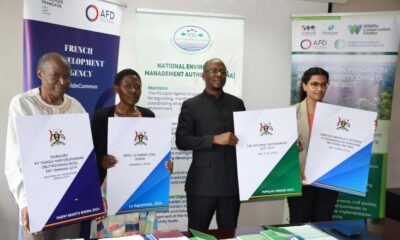Environment
Scaling up Environment Management in Uganda: Can Lessons from India Be Helpful?
By William Lubuulwa
Environmental challenges such as waste management, urbanisation, and climate change are growing concerns in Uganda. These issues require urgent, well-coordinated responses, and India, with its rich experience in addressing similar problems, offers a wealth of lessons for Uganda. From renewable energy uptake to public investments in environmental conservation, India’s success stories provide a blueprint for how Uganda can enhance its environmental management framework.
While Uganda has made significant strides, particularly through the efforts of the National Environment Management Authority (NEMA), much more can be done to ensure a win-win environment for both humanity and nature.
NEMA plays a crucial role in Uganda’s environmental management, driving initiatives such as wetland restoration, forest conservation, and environmental education campaigns. For instance, the restoration of the Lubigi Wetland and other wetland systems across the country has shown the government’s commitment to preserving critical ecosystems. Additionally, NEMA has taken a firmer stance on enforcement through punishing environmental offenders with heavier penalties, a move that is resulting in a reduction in illegal activities such as wetland reclamation.
The Yonja Uganda initiative, which focuses on waste management and anti-littering campaigns, has significantly raised awareness about proper waste disposal and community-level involvement in environmental protection. Despite these advancements, scaling up these efforts would further strengthen Uganda’s environmental management framework.
Hyderabad’s Waste-to-Energy Initiatives
One of Hyderabad’s most innovative achievements is its trash-to-treasure initiatives that convert waste into biogas and fertilizer. For example, the TPD Biogas Plant at the large Bowenpally Vegetable Marketprocesses over 10 tonnes of organic waste daily to produce biogas, which is used to generate electricity to power nearby streetlights and homesteads. There is also one supporting Rajiv Gandhi International Airport to reduce carbon emissions by more than 8,000 tonnesannually, according to the Telangana State Renewable Energy Development Corporation. This initiative demonstrates how large infrastructure projects can integrate renewable energy solutions to promote sustainability. Such initiatives not only help local governments manage waste but also provide energy solutions for local communities.
Uganda could replicate this approach in key sectors such as aviation, hospitality, and public infrastructure. For instance, the country’s Entebbe International Airport could benefit from a biogas plant to manage solid waste generated by airport operations, and that produced by Entebbe Municipality in general. Experts suggest that with the right investment, a biogas facility at Entebbe could process up to eight tonnes of organic waste per day, reducing landfill use and promoting cleaner energy for airport operations.
Kampala’s Kalerwe, St. Balikuddembe, Nakasero and Nakawa markets, which generate significant organic waste, could adopt similar waste-to-energy technologies, providing clean energy for surrounding neighborhoods and reducing the burden on landfills.
Green Energy and Electric Vehicles
India has set global benchmarks in renewable energy, particularly in solar power generation. Data from India’s Ministry of New and Renewable Energy shows that as of 2023, the country had installed more than 70 gigawatts (GW) of solar power capacity, a major leap from just 3 GW in 2014. The Indian government’s target is to increase this figure to 280 GW by 2030. This is driven by public investments, government subsidies, and private sector involvement in solar projects. Solar parks across the country, such as in Bathinda, Punjab, have significantly contributed to India’s renewable energy goals.
Uganda has similar potential for solar energy development, given its abundant sunshine. According to the Uganda Solar Energy Association, Uganda currently has an installed capacity of about 60 megawatts of solar power, far below its potential. By increasing public investments and encouraging private sector participation, Uganda could emulate India’s rapid solar growth. Experts project that Uganda could increase its solar power capacity by more than 300% within the next decade, decreasing its reliance on hydroelectric power and contributing to national energy security.
India’s cities are also pioneers in promoting electric vehicles (EVs) for public transportation. In Bangalore, electric buses and rickshaws are gradually replacing diesel-powered vehicles, reducing air pollution and fuel dependency. As of 2022, India had sold over onemillion EVs, supported by subsidies and investments in charging infrastructure. Kampala could similarly benefit from adopting electric buses for its public transport system. With the proper incentives, Uganda could reduce its urban air pollution by 30% and cut its fuel import bills significantly by investing in EVs.
The Dancing Boat in Telangana
India’s environmental conservation efforts have also been paired with innovative tourism projects that boost both the economy and environmental awareness. A shining example is Telangana’s ‘Dancing Boat’ on the Hussain Sagar Lake in Hyderabad. This eco-friendly, solar-powered boat offers tourists scenic rides while promoting green tourism. With its unique design and entertainment features, including LED light displays and music, the Dancing Boat attracts more than 1,000 visitors per day, showcasing how tourism can support environmental and cultural conservation.
Kampala could explore similar green tourism initiatives, leveraging its rich natural resources and water bodies. The Lubigi Wetland, Lake Victoria shores, and the Mabira Forest could be transformed into eco-tourism hubs, offering visitors environmentally friendly experiences while promoting the importance of conservation.
A few days ago, NEMA’s Executive Director informed journalists that there is a developing conversation between the environmental watchdog and the Mengogovernment over the environmental and tourism potential of Kabaka’s lake in Kampala. By investing in green tourism infrastructure such as that, Kampala could see a 20% increase in tourism revenues while promoting sustainable urban development.
Rainwater Harvesting and Water Conservation
Water scarcity is a pressing issue in many Indian cities, and rainwater harvesting has become a critical solution. Hyderabad and Noida are examples where mandatory rainwater harvesting policies have been implemented. Records from India’s Central Ground Water Board show that rainwater harvesting structures have helped increase groundwater levels by 10% in urban areas over the past five years. In Bangalore alone, rainwater harvesting is estimated to have saved the city 10 billion litres of water annually.
Some parts of Uganda face similar water challenges, particularly during prolonged dry spells. The country could, therefore, replicate India’s successful water conservation initiatives by mandating rainwater harvesting in all new buildings, especially in urban centres. By promoting household-level water storage solutions, Uganda could mitigate the impacts of erratic rainfall patterns and reduce pressure on the water stressed areas.
Capacity Building for Environment Management
One of India’s strengths in environmental management lies in its emphasis on capacity building. Institutions such as the Centre for Environmental Education, the Environment Protection Training and Research Institute, the Indian Institute for Human Settlements, and the Central Pollution Control Board, provide specialised training programmes for government officials, environmentalists, and civil society members. These programmes focus on climate resilience, sustainable development practices, and environmental governance.
Uganda could benefit from establishing similar centresof excellence for environmental training. For instance, NEMA could be upgraded to a specialised certificateand diploma awarding institute, modeled after Uganda’s Law Development Centre or Uganda Management Institute. By providing formal education and certification in environmental management, NEMA could strengthen the capacity of public officials and private stakeholders to implement sustainable practices. Experts suggest that such a transformation could significantly boost Uganda’s environmental governance, equipping the next generation of leaders with the knowledge and skills needed to address complex environmental challenges.
India’s Environmental Challenges Are Far from Over
The successes do not mean that India’s challenges are over. Despite the Asian giant’s remarkable strides in renewable energy, waste management, and green tourism, it continues to grapple with severe environmental issues such as air pollution, groundwater depletion, and deforestation. For instance, air quality in cities such as Delhi still reaches hazardous levels, particularly during the winter months when smog cloaks the capital. In rural areas, deforestation and agricultural overuse of groundwater remain persistent concerns. However, these challenges should not diminish the significance of India’s progress. India is not in environmental heaven yet, but its journey offers valuable lessons that Uganda can learn from.
Great lessons, further actions needed for Uganda
India’s multifaceted approach to environmental management offers a wealth of lessons for Uganda. From effective waste management in Hyderabad to renewable energy success stories in Bathinda and green tourism innovations like the Dancing Boat, India demonstrates how concerted efforts in policy, investment, and capacity building can lead to transformative outcomes. By adopting similar strategies, and building on the solid foundation already laid by NEMA, Uganda can scale up its own environmental management systems, reduce its reliance on non-renewable resources, and build resilience to climate change. While Uganda has made commendable progress through initiatives such asYonja Uganda, wetland restoration efforts, and prosecution tightening further action can only strengthen the country’s commitment to a sustainable future for all.
Mr. Lubuulwa is the Senior Public Relations Officer at NEMA.








































